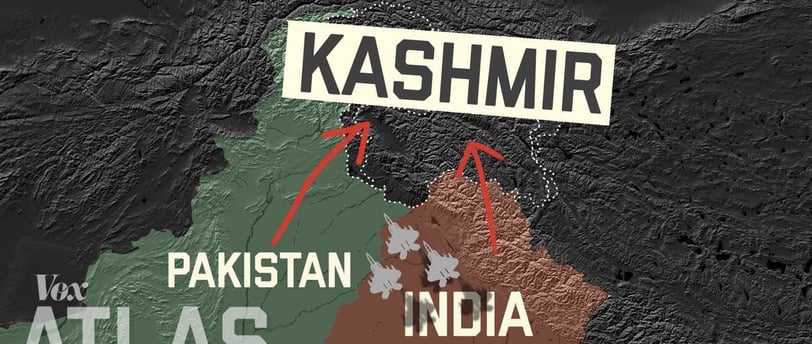Understanding the Kashmir Conflict: A Deep-Rooted Struggle
The Kashmir conflict stands as one of South Asia’s most enduring and complicated issues, deeply influenced by colonial legacies and the challenging geopolitics that followed independence. The ongoing struggle between India and Pakistan over Jammu and Kashmir continues to strain diplomatic relations, fuel nationalistic sentiments, and threaten regional stability. However, the conflict transcends mere territorial disputes—it is equally about identity, autonomy, and historical justice.
Parikshit sharma, 3rd year, BBA., LL.B (hons.)
5/1/20252 min read


How It All Began:
In 1947, with the end of British colonial rule, the Indian subcontinent was partitioned into two sovereign states: India and Pakistan. The princely states, which had enjoyed a degree of autonomy under British suzerainty, were given the choice to join either dominion. Jammu and Kashmir, a princely state with a predominantly Muslim population under the rule of Hindu Maharaja Hari Singh, initially sought to remain independent.
This fragile balance shattered when tribal militias from Pakistan invaded the region. Facing an existential threat, the Maharaja requested military assistance from India. India agreed—but only after the Maharaja signed the Instrument of Accession, formally integrating Jammu and Kashmir into the Indian Union.
This triggered the first armed conflict between India and Pakistan. A United Nations-brokered ceasefire eventually resulted in the division of the territory: India retained control over the larger portion, while Pakistan administered areas that came to be known as Azad Jammu and Kashmir (AJK) and Gilgit-Baltistan. The Line of Control (LoC), drawn as part of the ceasefire arrangement, remains the de facto boundary, although the fundamental dispute remains unresolved.
National Agendas and Political Posturing:
Over the years, Kashmir has been woven into the very fabric of national identity for both countries. For Pakistan, it symbolizes the cause of Muslim self-determination. For India, the accession of Jammu and Kashmir is seen as legally binding and beyond negotiation.
Various attempts at diplomatic resolution—such as the Shimla Agreement (1972) and the Agra Summit (2001)—have been made but ultimately fell short of achieving lasting peace. Tensions escalated dramatically in 2019 when India abrogated Article 370, which had granted special autonomous status to Jammu and Kashmir. Pakistan responded by downgrading diplomatic ties and intensifying efforts to internationalize the issue, although with limited success on the global stage.
Life on the Ground: The Human Cost:
Amid political maneuvering, the daily realities faced by the people of Kashmir are often overlooked. In Indian-administered Kashmir, residents grapple with frequent curfews, a heavy security presence, internet shutdowns, and civilian unrest. In the territories under Pakistani control, concerns persist regarding press freedom, governance deficiencies, and underdeveloped infrastructure—although these issues garner far less international attention.
A Wider Strategic Lens:
The Kashmir conflict is not solely a bilateral matter between India and Pakistan; it also involves China. China's claims over Aksai Chin and its deepening engagement through the China-Pakistan Economic Corridor (CPEC) add another dimension to the dispute. With three nuclear-armed states involved, even seemingly minor skirmishes hold the potential to escalate dangerously, posing risks to both regional and global stability.
Is Peace Possible—or Merely Political Rhetoric?
Despite numerous calls for dialogue and initiatives aimed at building trust, meaningful progress remains elusive. Deep-seated political positions, surging nationalism, and divided public opinion continue to hinder reconciliation. Although civil society efforts and occasional international mediation attempts surface, they are frequently undercut by entrenched political interests.
Conclusion:
The Kashmir conflict is far more complex than a simple territorial disagreement—it encompasses layers of historical grievances, legal arguments, political ambitions, and human suffering. Genuine peace will require more than diplomatic gestures; it demands earnest political will from both India and Pakistan, a sincere commitment to de-escalation, and a renewed focus on the lives and aspirations of the people who continue to bear the heaviest burden of this enduring conflict.
References:
BBC News – Kashmir conflict: A brief history
Council on Foreign Relations – Conflict Tracker: India and Pakistan
EBSCO Research Starters – India and Pakistan Clash Over Kashmir
Because Every Legal Mind Deserves a Great Conversation.
Legaltea.in@gmail.com
+91 6284295492
MSME Certified
© 2025 Legal Tea. All rights reserved.


